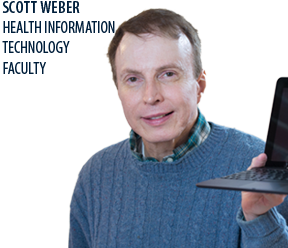Health Information Technology is Popular Career Choice
 Scott Weber believes it’s a privilege to serve as guardian of a patient’s healthcare records.
Scott Weber believes it’s a privilege to serve as guardian of a patient’s healthcare records.
The records, also known as health informatics, are valuable, private documents that chronicle a patient’s medical history. At NECC, Health Information Technology students learn how to properly acquire, store, and retrieve, this healthcare information.
A former healthcare provider himself, Weber knows of what he teaches – a seasoned nurse, he has made health informatics his business.
A business that is evolving rapidly in large part due to the Affordable Care Act and the industry-wide move from paper to electronic records. The changes in health informatics are occurring at a rate that Weber hasn’t seen in his 36 years in the medical field.
“I learn something new and exciting every day,” he says.
Information he is quick to share with students enrolled in Northern Essex’s new Health Information Services Programs.
These programs include the Health Information Technology (HIT) associate degree program or Electronic Health Record Specialist (EHRS), Medical Billing, or Medical Coding Certificate Programs. Weber is program chair of the HIT and EHRS programs.
These departments, says Weber, are the “nerve centers” of hospitals.
“They function in health facilities like our brain and nervous systems manage all the physiological processes in the human body,” he says. “It’s the administrative complement to nursing.”
Health information technology is an interesting mix of several disciplines. It includes elements of business, computer information technology, and health sciences, he notes.
Weber is not unlike the very program he teaches. He brings a broad mix of disciplines to his position. In addition to a Bachelor of Arts in History and Child Development from Augsburg College, he holds a Bachelor of Science in Health Information Management from the University of Texas Medical Branch at Galveston, a Bachelor of Science in Nursing from the University of Wisconsin-Milwaukee, a Master of Science in Nursing from the University of Wisconsin-Madison, and a Master of Education and a Doctorate of Education in The Psychology of Learning from Boston University. He also completed an advanced education nurse traineeship in primary care nursing from the University of Illinois at Chicago College of Nursing and Mile Square Health Center in Chicago.
In many ways, Weber has been studying all his life for his current role.
“It’s exciting to be on the front lines of health care reform in this country,” he says.
Health Informatics is such a priority, that the Federal government has created a federal agency to oversee it and the U.S. Labor Department estimates that the number of jobs in the health informatics field will increase by 22* between 2012 and 2022.
Weber shares his enthusiasm for health informatics with his students.
“I particularly enjoy teaching medical terminology because it is a gateway course,” he says. “It’s the first college course many students in the class will be taking. It’s my goal to try and make the students’ initial experiences rewarding and energizing so they become as excited by the medical fields as I am to teach in them.”







